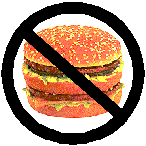
HOW MUCH DOES A FAST FOOD
HAMBURGER REALLY COST?
HUMAN HEALTH - Seventy percent of U.S. deaths are related to diet, particularly the overconsumption of beef and saturated animal fats. Red meat is directly linked to heart disease. strokes, and cancer of the colon and breast.
WORLD HUNGER - At a time when nearly a billion people suffer from chronic hunger, more than one-third of all the grain grown in the world is fed to cattle and other livestock. That's enough to give every child, woman and man a meal a day.
ANIMAL SUFFERING - Each and every day, 100,000 cattle are slaughtered in the U.S. Thousands more are slaughtered in Canada and Mexico. Their deaths are cruel and horrible shocked with electric prods, beaten and kicked, shot with a stun-gun, hung by their feet, their throats cut.
WAR AGAINST WILDLIFE - As more land is turned over to cattle raising, wild animals are being exterminated. Millions of wild creatures, from coyotes to mountain lions and birds are killed every year by the government as a "public service" to livestock interests.
DESTROYING THE RAINFORESTS - Cattle ranching is a primary cause of rainforest destruction in Central and South America. Since 1960, more than 25 percent of the forests of Central America have been cleared to create pasture land for grazing cattle. While some fast food chains claim they no longer use Central American beef, for every quarter pound hamburger still being exported from this region, 55 square feet of rainforest is destroyed.
POLLUTING AND DEPLETING OUR WATER - Cattle produce a billion tons of organic waste each year. Waste from livestock, and the pesticides and fertilizers used to grow feed, are the number one non-point source of water pollution in North America. Moreover, almost half the water used in the U.S. each year goes to grow feed and provide drinking water for cattle and other livestock. It takes 29 gallons of water to produce a pound of tomatoes; 139 gallons to produce a pound of bread; but 2,464 gallons to produce a pound of beef.
CREATING DESERTS - Cattle are major contributors to soil loss and destruction. As much as 85 percent of U.S. western rangeland, nearly 685 million acres, is being degraded by the overgrazing of livestock. North America has already lost a third of its topsoil; more than 80 percent of this erosion is directly attributed to grazing and unsustainable methods of producing feed crops for cattle and other livestock.
GLOBAL WARMING - Cattle are a major source of greenhouse gases. Tens of millions of tons of methane are released into the atmosphere by the world's 1.3 billion cattle. In addition, hundreds of millions of tons of CO2 are released by burning forests to create cow pastures.
CHILDREN'S RIGHTS - Children, as well- as adults, have a basic right to know the true facts about nutrition, health, and the social and environmental consequences of what they buy and consume. McDonald's and other fast food giants have long targeted children with an advertising message that is both one-sided and misleading.
FARMER AND WORKER'S RIGHTS - People everywhere have a basic right to decent wages, humane working conditions, and a liveable environment. Millions of food service workers in North America make only the minimum wage. The people who work in the beef and food service industry often work under unhealthy and unsafe conditions. Slaughterhouse workers have one of the highest rates of accidents on the job of any occupation.
|
BARGIN BURGER? NOT FOR... |
- an epidemic of high blood pressure, heart attacks, strokes, colon and breast cancer, and food poisoning
- grain fed to cows instead of millions of starving people
- water pollution, topsoil erosion, and rainforest destruction
- millions of tons of methane, a greenhouse gas, released
- trillions of gallons of water used to grow livestock feed
- tens of millions of cows brutally slaughtered
|
HAPPY MEALS? NOT FOR... |
- family farmers going broke and native people thrown off their land by the cattle barons
- underpaid farmworkers and ranch hands
- workers in dangerous and unhealthy slaughterhouses
- millions of minimum wage food service workers
How much of that $1 or $2 you just spent goes to these hard-working people?
|
IS THERE AN ALTERNATIVE? YES! |
- REDUCE your beef consumption by 50%.
- REPLACE the beef in your diet with organic vegetables, grains and fruits.
- REFORM the current system of ranching and farming. Buy family farm products which are organically and humanely-raised.
- EDUCATE yourself; your friends and your community about these issues.
- LOBBY McDonald's to put a non-meat (veggie) burger on the menu and promote it with 25% of their ad budget.
- TELEPHONE or VISIT the manager of this restaurant. Tell McDonald's to put a veggie burger on the menu now!
- JOIN the Beyond Beef coalition.
Contact us at:
Beyond Beef,1130 17th Street NW,Suite300 Washington,DC 20036
